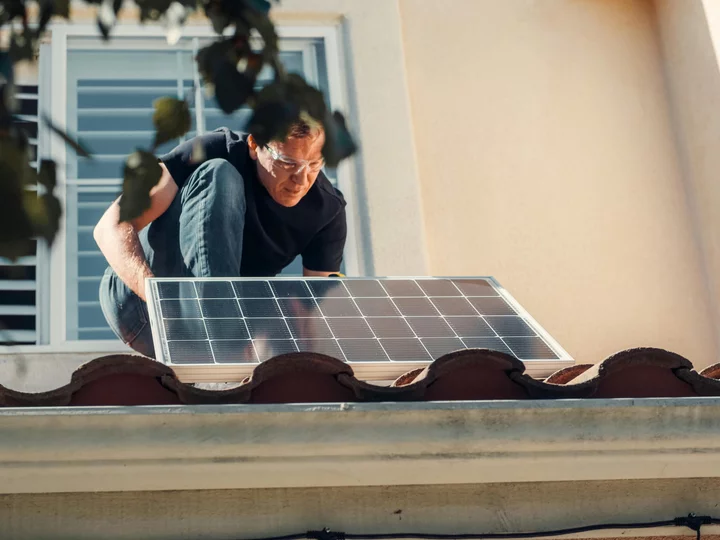Photo by Kindel Media via Pexels.
Hundreds of homes in Joe Patterson’s Northern California Assembly district burned to the ground in the Caldor Fire.
In the three years since that devastating summer, many of those rebuilding homeowners have ended up on the hook for tens of thousands of dollars, thanks to state laws that require solar panels on new homes — even on those that didn’t have them before they burned down.
“Trust me when I say this: $25,000 to build solar onto a house where people do not have solar is 100% an impediment to rebuilding,” Patterson, a Republican from Rocklin, told the Assembly Natural Resources Committee earlier this week.
Patterson’s Assembly Bill 2787, which passed the committee unanimously, would give some of those poorly-insured, low- and middle-income homeowners rebuilding after a natural disaster a break from the state’s solar-panel building requirement.
The bill would exempt homeowners at or below the median income for their county from the state’s building codes that require new solar on homes if they’re damaged or destroyed in a natural disaster. The legislation, which would expire in 2028, also would limit the benefit to those who don’t have an insurance plan that would cover the costs of the upgrade to new solar.
The bill now moves to the Assembly Appropriations Committee, where it faces an uncertain future. Last year, that committee killed a similar bill by Republican Assemblymember Jim Patterson of Fresno.
Joe Patterson, no relation, told CalMatters he expects his bill, which is coauthored by the Fresno Republican, to make it through the committee this time since it doesn’t contain funding for a study like last year’s bill.
It’s another matter whether Gov. Gavin Newsom will sign it if the bill is also approved in the Senate and reaches his desk. In 2022, Newsom vetoed a similar bill, citing the need for solar power to reduce greenhouse gases that are a contributing factor for wildfires.
Solar power is a critical part of the state’s ambitious goal to achieve 90% carbon-free electricity by 2035 and 100% by 2045. Large-scale and rooftop solar is projected to prove more than half of the grid’s power by 2045.
“Extending this exemption would nullify these positive outcomes and instead would increase homeowner energy costs at a time when many homeowners are facing rising electric rates and bills,” Newsom wrote in his veto message.
Asked about this latest bill, Newsom’s press office responded that the governor doesn’t typically comment on pending legislation.
Joe Patterson said he hopes Newsom would support this bill, given that it’s more narrow than the one he vetoed in 2022, and because some Caldor Fire victims with poor insurance say they never received federal disaster relief cash to help them rebuild.
Meanwhile, the insurance crisis in California’s wildfire country has only gotten worse since.
After the devastating wildfire seasons of 2017 and 2018, private insurance companies have been dropping policies for hundreds of thousands of Californians, forcing many to join the state’s home insurer of last resort known as FAIR plan or risk going uninsured.Just last month, State Farm announced it wasn’t renewing 72,000 California home and apartment policies.
In his testimony before the Natural Resources Committee, Patterson said his district has seen skyrocketing numbers of constituents on the FAIR Plan.
“In 2019, we had roughly 8,100 households covered by the FAIR Plan in my district,” Joe Patterson told the committee. “Now, in 2023, we have 41,000 people covered by the FAIR Plan.”
He said the FAIR plan, at most, will only pay 10% of the costs to upgrade a destroyed home to the most current building codes including mandatory solar panels.
“And that 10% coverage really won’t go very far, especially to cover a solar system that costs about $25,000,” Patterson told the committee.
As Patterson testified, sitting beside him was El Dorado County Supervisor George Turnboo. His district includes Grizzly Flats, which was torched in the Caldor Fire.
“The costly burden on the Caldor Fire survivors trying to rebuild their lives is not worth the minimal benefit solar technology provides them in a very high snow and forest region,” Turnboo said.
Their arguments resonated with the 11 members of the Natural Resources Committee, including eight Democrats, who voted to pass the bill over objections from the solar industry.“We understand the very sympathetic plight that some of these folks are in,” said Kim Stone, a lobbyist for the California Solar and Storage Association. “But we don’t exempt them from other building code upgrade requirements.”
###
CalMatters.org is a nonprofit, nonpartisan media venture explaining California policies and politics.

CLICK TO MANAGE